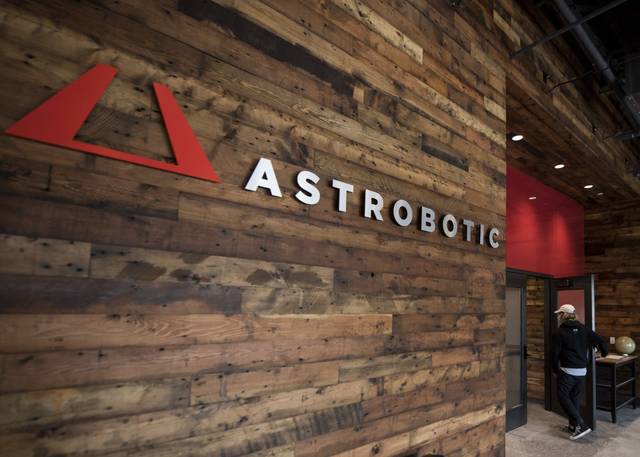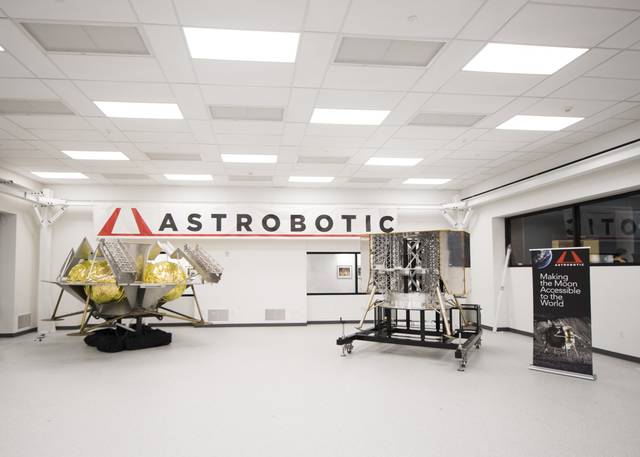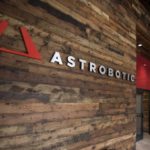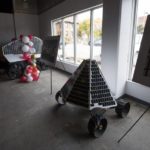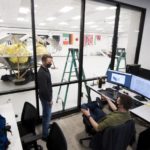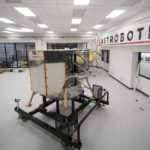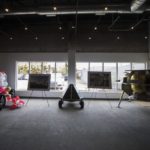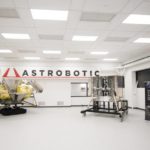Ground control for the first commercial trip to the moon will be at a nondescript building on Pittsburgh’s North Side near the Manchester neighborhood.
A group of federal, state and local officials on Monday celebrated a private ribbon-cutting for Astrobotic’s headquarters at the 47,000-square-foot complex at 1016 North Lincoln Ave.
The out-of-this-world startup was launched in 2007 as a spinoff of Carnegie Mellon University’s Robotics Institute, and has burgeoned since it started in a 400-square-foot room above a bagel shop in Pittsburgh’s Oakland neighborhood.
It also has found space at a former Strip District industrial space and an office Downtown. In December 2019, the company announced it was locating to the North Side and it officially celebrated the move this week.
“We are literally in Pittsburgh’s backyard,” Astrobotic CEO John Thornton said.
Since the company launched, Thornton, 36, a CMU alum, and the Astrobotic staff have grown from a company with big dreams of delivering commercial payloads to the moon to one that’s getting close to making those deliveries a reality.
“It’s taken 13 years to get that done,” Thornton said.
In the last year-and-a-half, the company has grown from 18 employees to more than 100, it has landed multimillion-dollar contracts with NASA and has wooed and wowed local and national leaders to secure funding for its plans to build lunar landers, named Peregrine and Griffin, for the planned trips to the moon.
It’s also looking to hire Pittsburghers. Although many of the positions require people to be engineers or have specialized experience, that isn’t always the case, Thornton said. “We would love to hire more Pittsburghers,” he said.
To lay the groundwork for its plans thus far, Astrobotic received $285,000 in state job creation tax credits as it commits to investing $6.5 million and employing at least 95 people.
It’s also been helped by the Allegheny Conference on Community Development and its Strategic Investment Fund, which is providing a nearly $7 million in gap funding loan.
“It’s a pretty unbelievable Pittsburgh story,” Allegheny Conference CEO Stefani Pashman said.
She admits that as the professionals who manage the Strategic Investment Fund were approached by Astrobotic, it was “an unusual business proposition.”
But the company has a solid plan and the NASA contracts and private entities that have committed to it made Astrobotic something the Allegheny Conference wanted to support. Pashman called it an “emblematic moment for the region.”
“We can make sure it happens,” she said. “It was clear they need this additional funding to close the gap so we were thrilled to deal with that.”
Because of the nature of its business, Astrobotic had a tough time getting a private bank loan to finance its headquarters, Thornton said.
The support from organizations like the Allegheny Conference and federal, state and local government leaders has been “invaluable,” he said.
It was challenging and much of the last 13 years, Thornton has been working to convince people that Astrobotic’s plans were feasible.
The company fits the bill of the type of businesses economic development leaders want to attract to Pittsburgh and surrounding areas, Pashman said.
People who could be elsewhere working in the aerospace industry are choosing to work with Astrobotic and move to Pittsburgh, and it’s exciting, she said.
“We are on the map,” Pashman said. “People are taking a chance and believing in Manchester.”
Pittsburgh Mayor Bill Peduto was 5 during the first moon landing in 1969. “By the time I was 6 years old, I could name every planet,” he said of his fascination with space exploration.
With Astrobotic in Pittsburgh, the reality of space exploration is “now down the street for every young Pittsburgh child,” he said in a statement.
This afternoon, Mayor @billpeduto joined federal, state, & local leaders to celebrate the grand opening of @astrobotic’s new headquarters in #Pittsburgh’s Manchester neighborhood.
— Office of the Mayor (@TheNextPGH) October 19, 2020
This innovative company is contracting with @NASA for an incredible mission to the Moon. pic.twitter.com/7V10JfbOUE
U.S. Secretary of Commerce Wilbur Ross joined a bevy of officials who were invited to the opening of the facility.
“You (Astrobotic) are currently leading the market with seventeen contracts in place for your first mission with customers in seven countries,” Ross said, according to a release. “The Commerce Department will continue to make resources available to you and to the broader U.S. commercial space industry to ensure that we remain the leader in space commerce.”
Astrobotic’s first mission is set for next year using its Peregrine lander. It would be the first American spacecraft on the moon since the Apollo program ended in the 1970s and is funded by a $79.5 million contract awarded by NASA.
In 2022, a second NASA mission, dubbed Moonrover, is planned to deliver an autonomous moon rover that’s funded by another $5.6 million NASA contact.
A third mission, dubbed Griffin, is planned for 2023, to deliver the Viper rover to explore the lunar south pole in anticipation of a manned return to the moon. It is funded by a $199.5 million NASA contract.
Although Astrobotic’s work has been delayed because of the covid-19 pandemic, Thornton remains hopeful for a mission at some point next year.
“This is a culmination of 13 years of work. We have a facility, mission control, we’ve got the team now,” Thornton said. “There’s a clear path and a countdown to launch. This is the dream and it’s now becoming a reality.”


